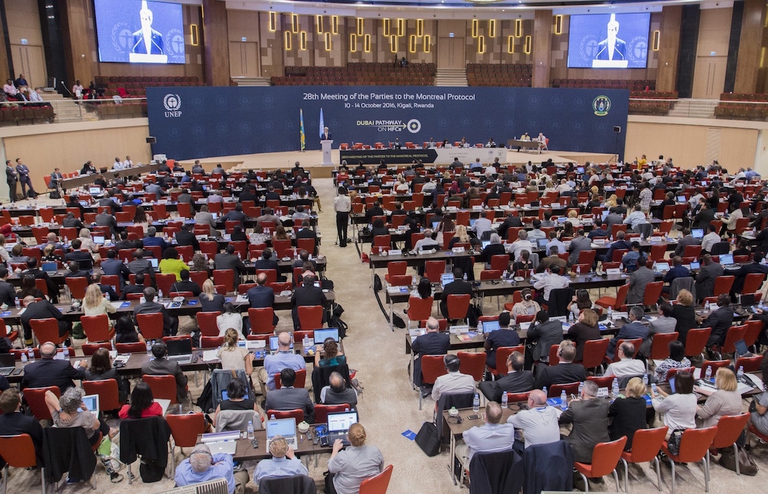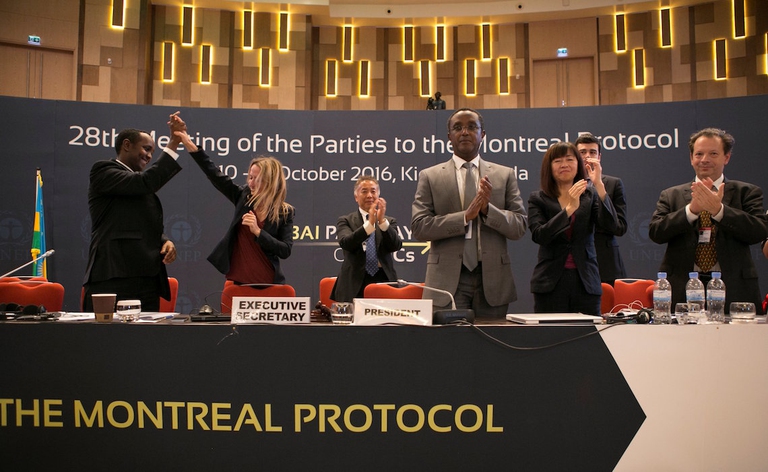
After a landslide led to twelve deaths on the island of Ischia, questions have been raised about the impacts of illegal building, tourism, and climate change.
Passo avanti storico nella lotta ai cambiamenti climatici: 197 governi hanno vietato l’uso dei gas idrofluorocarburi, particolarmente nocivi per l’ambiente.
The heads of state of 197 countries have signed a historic agreement aimed at phasing out hydrofluorocarbons (HFCs), which are greenhouse gases 14,000 times more potent than CO2. The deal represents a monumental step forward in the fight to combat climate change. It has been reached by the countries that sealed the Montreal Protocol, which was adopted in 1987 and had the goal of phasing out clorofluorocarbons (CFCs), largely used in air-conditioners and refrigerators.
CFCs are substances responsible for the depletion of the ozone layer and their ban represented a huge environmental success. The confirmation comes from a study, conducted in September 2015 and published in the Science journal, that shows that the ozone hole above Antarctica – mainly caused by human-related activities – has shrunk compared to 2000.
During the 28th Meeting of the Parties held in Kigali, Rwanda, and after 7 years of negotiations, governments decided to continue the positive momentum of the Montreal Protocol. However, Clare Perry, chairperson of the NGO Environmental Investigation Agency, told Le Monde that what convinced governments not to block the deal was “their will to not go down in history as the ones responsible for the failure of the most important climate negotiation of 2016”.
Technically, the deal is called the Kigali Amendment. It remedies the only drawback of the phasing out of CFCs set in 1987. Over the years after the adoption of the Montreal Protocol, in fact, hydrofluorocarbons have skyrocketed, as they were used to replace CFCs. Thanks to the deal reached in Rwanda, 72 billion tonnes of CO2 equivalent won’t be released into the atmosphere by 2020, an amount equal to Germany’s annual emissions.
Siamo anche su WhatsApp. Segui il canale ufficiale LifeGate per restare aggiornata, aggiornato sulle ultime notizie e sulle nostre attività.
![]()
Quest'opera è distribuita con Licenza Creative Commons Attribuzione - Non commerciale - Non opere derivate 4.0 Internazionale.
After a landslide led to twelve deaths on the island of Ischia, questions have been raised about the impacts of illegal building, tourism, and climate change.
Not much snow, peaks of 19 degrees Celsius in Norway and even 28 degrees in France: official data confirms the anomalously high temperatures of this past winter.
Ocean warming has risen to record highs over the last five years: just in 2019 the heat released into the world’s oceans was equivalent to that of 5-6 atomic bombs per second. The culprit, no doubt, is climate change.
What did Greta Thunberg tell participants at the 2020 World Economic Forum in Davos? Once again, the Swedish activist underlined the total lack of concrete solutions to the climate crisis presented by leaders so far.
The list of human and animal victims of the Australia wildfires keeps growing – one species might already have gone extinct – as the smoke even reaches South America.
Kivalina is located on a small island once guarded by sea ice, which is now melting due to global warming. While the sea threatens to wipe the village off the face of the Earth, its inhabitants refuse to give up their lives and traditions.
Thanks to activists, the voice of the world’s peoples resounded through the COP25 like an alarm bell. Governments didn’t reach the results they demanded, but their cries and messages were stronger than ever, reaching even those who weren’t in Madrid.
Climate change poses a risk for millions. However, women are the most vulnerable to its negative consequences: a few simple considerations by the Italian Climate Network help us perceive the global implications of this.
The COP25 ended two days late and with very few steps ahead made. Climate negotiations in 2020 will be an uphill battle as political will clearly seems to be lacking, once again.









